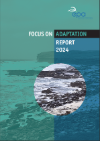Other guidance and reports
Browse recent relevant publications:
Focus on Adaptation Report 2024
Authors: EPA Climate Services Unit (Dr. Conor Quinlan, Katherine Dooley, Dervla McAuley), Dr. Chris Philips, Dr. Camila Tavares Pereira, Mary Frances Rochford, Dr. Tara Higgins

Download the full report here: EPA Focus on Adaptation Report 2024
This report highlights recent progress in Ireland’s climate change adaptation, covering areas including policy, governance, planning, climate services, risk assessment, and research. As climate change continues to impact Ireland, adapting to this new reality is essential for the country’s future resilience. Building this resilience requires a coordinated approach that includes strong institutions and governance, adequate resources, legal and regulatory support, regular vulnerability assessments, and climate action planning across national, sectoral, and local levels. Access to information and enhanced capacity for adaptation are also critical.
Ireland is making strides in adaptation, particularly in policy, governance, climate services, risk assessment, planning, regulation, research, and public engagement. This report details and summarises key developments that support these efforts.
Implementation of Climate Adaptation Indicators: Lessons Learned from the Transport Sector
Authors: Dr. Ned Dwyer, Dr. Denise McCullagh and Dr. Billy O’Keeffe

Download the full report here: Implementation of Climate Adaptation Indicators
Appropriate adaptation or resilience indicators provide a means to measure and quantify the status of climate adaptation, and the progress of adaptation actions in producing desired outcomes. These indicators help to define an existing situation and to track changes or trends over time. They can provide, for example, the degree of development or implementation of a policy process, or quantitative information, such as the total seasonal rainfall in a given area, or number of road bridges strengthened to withstand extreme weather events.
Through a co-development process with TII, 43 adaptation indicators were identified and agreed with TII management, that are both suitable and implementable for national roads and light rail; this comprised 19 climatological, 6 impact, 11 implementation and 8 outcome indicators.
The purpose of the project extended beyond the identification of the indicators to also identify and capture key lessons for the widespread development and adoption of adaptation indicators. 14 key lessons were identified and form the basis for six recommendations for developing climate adaptation indicators for national reporting.
Climate risk assessment approaches in the financial and commercial sectors
Authors: Dr. Christopher Phillips, Dr. Lydia Cumiskey, Cathal O’Mahony, Dr. Camila Tavares Pereira, Catriona Iulia Reid, Dr. Conor Quinlan, Dervla McAuley, Mary Frances Rochford

Download the full report here: Climate risk assessment approaches in the financial and commercial sectors
Focusing on lessons learned, the study explores the impact of guiding policies, legislation, and regulations on climate adaptation within the finance and commercial sectors, both internationally and nationally. The research includes a comprehensive literature review, emphasising the pivotal role of the Task Force on Climate-related Financial Disclosures (TCFD), Corporate Sustainability Reporting Directive (CSRD) and EU taxonomy frameworks in guiding climate risk assessment practices in relevant sectors.
The study included interviews conducted with 20 individuals in roles related to sustainability, risk management, and Environment, Social and Governance (ESG) within 11 diverse organisations spanning finance, commercial, consultancy, and climate services sectors. The interview topics were structured around three primary themes: current practices, policy and legislation, and climate actions.
The insights derived from this study focusing on the financial and commercial sectors, will inform the development of the National Climate Change Risk Assessment (NCCRA) methodology and risk assessment criteria.
